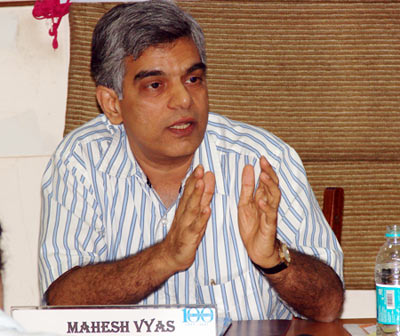Senior Congress leaders will be in Jaipur on Tuesday for a day's visit to finalise the arrangements for the three-day weekend extravaganza which will see over 5,000 party workers assemble in the pink city to chalk out party's road map for future challenges, reports Renu Mittal.
Not relying on the Ashok Gehlot-led government in Rajasthan to fine-tune the arrangements and iron-out last minute creases, the high-powered delegation will include Ahmed Patel, Janardhan Dwivedi, Motilal Vora, Ambika Soni and Mukul Wasnik. While Vora is incharge of the arrangements for the chintan shivir (brainstorming session), Soni is the convenor while Mukul is the general secretary incharge of Rajasthan.
With around 400 delegates to be divided into five subgroups according to the subject of their choice, each group will have over 75 delegates who will discuss and deliberate upon the issues.
Congress sources say the meetings will be convened at the Birla auditorium in Jaipur and the five-member committee will ensure there are enough rooms which can accommodate all the five large groups along with office staff and other All India Congress Committee employees to take notes along with stenos and other office help.
According to the detailed schedule being worked out, a meeting of the Congress Working Committee will be convened on January 19, the second day of the shivir, which will put together the noteworthy suggestions of the two-day meeting and finalise the conclusions in terms of policy papers which would then be put before the AICC meeting the next day.
The position papers prepared by the five subgroups are to guide the delegates and help them stick to the basic formulations. But sources point out that with so many delegates in each group, no one will be able to speak for more than a few minutes.
Interestingly, the subgroup on agriculture and rural development, which was to be headed by senior leader C P Joshi, has now been included in the group on socio-economic challenges. This group is headed by AICC general secretary Digvijaya Singh and includes B K Hari Prasada, Veerappa Moily, Kumari Selja, Kishore Chandra Deo, Sachin Pilot and Charan Das Mahant.
The agriculture group had included C P Joshi, Ajit Jogi, Jairam Ramesh, G K Vasan, Sunil Jhakhar, Renuka Chaudhary and Deepender Hooda.
Senior Congress leader from Rajasthan Girija Vyas is heading the group on empowerment of women which has as its members Krishna Tirath, Jayanti Natrajan, Sushila Tiriya, Veerapa Moily and Jairam Ramesh.
The group on emerging political challenges is headed by Union Defence Minister A K Antony and has other heavyweights like P Chidambaram, Sushilkumar Shinde, Sheila Dikshit, Manish Tewari, S C Jamir and Ashok Tanwar as its members.
The group on organisational strengths is headed by Ghulam Nabi Azad and includes Girija Vyas, Mukul Wasnik, Mohan Prakash, Harish Rawat and Suresh Pachauri as its members.
The group on India and the world is headed by former external affairs minister S M Krishna and includes Anand Sharma, Salman Khurshid, Pu Lalthanwala, Jyotiraditya Scindia, Nawang Rijzin Jora and Shashi Tharoor.
All the position papers are now in and Congress president Sonia Gandhi has been meeting leaders of the groups to ascertain their formulations to carry forward the discussions which would culminate in the AICC meeting where a Jaipur declaration is expected to be released outlining the party's charter for the future.
The declaration would also include strategies to seek new partners, its attempt to amalgamate the ongoing reforms agenda with the socio-economic realities of the aam admi, the need to strengthen the organisation and capitalise on the pan-India presence of the party which is present in each block, the need to harness youth energy which has been agitating against corruption, the Delhi gang rape case and the need to use this energy for the good of the country as well as a host of other issues.
In the first big meeting of the Congress since the Presidential elections last year, the party leadership is missing the presence of senior leader Pranab Mukherjee. He has been the repository of the Congress history and has time and again played a key role in formulating policies as well as giving an intellectual and political thrust to the party resolutions.
The party has not been able to find his replacement and no one from West Bengal has been included in the subgroups formed to draft the position papers on key issues.








